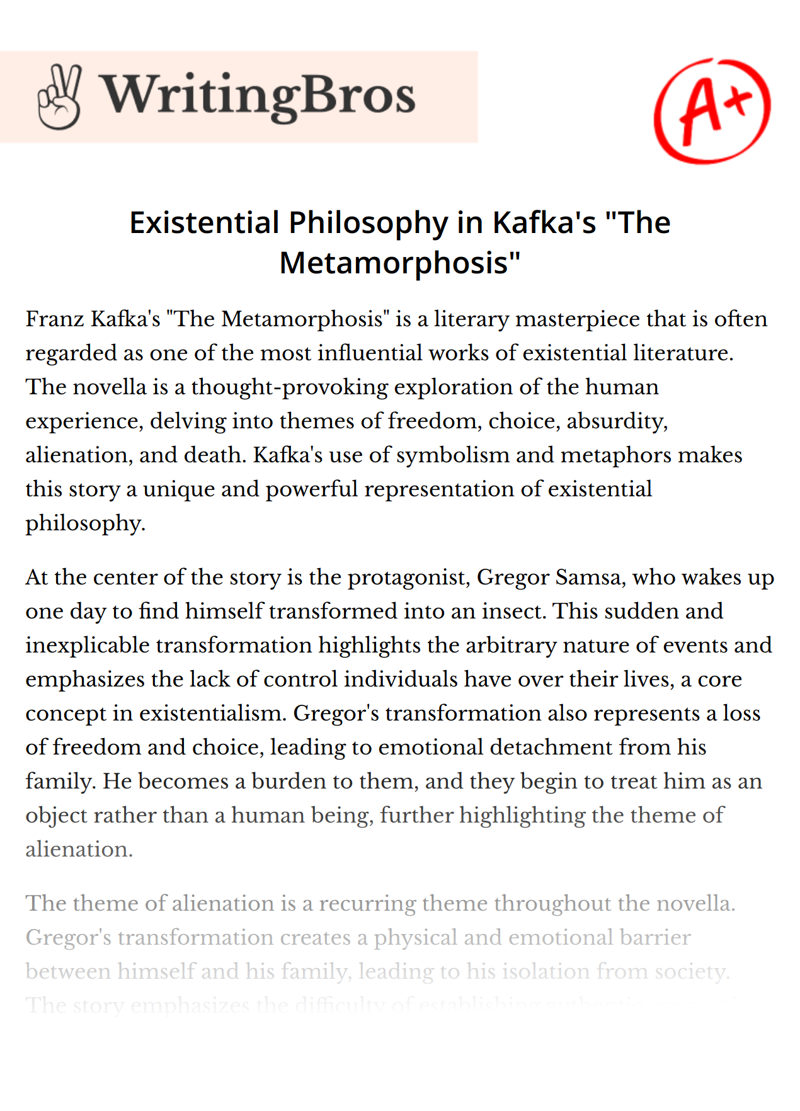Existential Philosophy in Kafka's "The Metamorphosis"

Franz Kafka's "The Metamorphosis" is a literary masterpiece that is often regarded as one of the most influential works of existential literature. The novella is a thought-provoking exploration of the human experience, delving into themes of freedom, choice, absurdity, alienation, and death. Kafka's use of symbolism and metaphors makes this story a unique and powerful representation of existential philosophy.
At the center of the story is the protagonist, Gregor Samsa, who wakes up one day to find himself transformed into an insect. This sudden and inexplicable transformation highlights the arbitrary nature of events and emphasizes the lack of control individuals have over their lives, a core concept in existentialism. Gregor's transformation also represents a loss of freedom and choice, leading to emotional detachment from his family. He becomes a burden to them, and they begin to treat him as an object rather than a human being, further highlighting the theme of alienation.
The theme of alienation is a recurring theme throughout the novella. Gregor's transformation creates a physical and emotional barrier between himself and his family, leading to his isolation from society. The story emphasizes the difficulty of establishing authentic connections with others, and the loneliness that comes with this experience. Kafka's use of symbolism is evident in the scene where Gregor crawls on the walls and ceiling, unable to communicate with his family, emphasizing his isolation and detachment from the human world.
The story also addresses the theme of death, a significant topic in existential philosophy. Death represents the ultimate absurdity of human existence, as it is an event beyond an individual's control. The ending of the story, where Gregor dies and his family moves on with their lives, emphasizes this theme. The family's indifferent reaction to his death highlights the idea that death is an unavoidable and accepted part of life. This emphasizes the idea that life is meaningless and ultimately futile.
The novella also highlights the significance of individuality, particularly in the character of Gregor. He is depicted as an individual who is fundamentally different from those around him. His transformation into an insect is a physical manifestation of his innermost thoughts and desires. Kafka's use of symbolism here is evident in the description of the insect's body, which represents the inner self that Gregor had repressed. The story highlights the importance of individuality and authenticity, encouraging readers to embrace their uniqueness and take ownership of their lives.
Furthermore, "The Metamorphosis" emphasizes the absurdity of the human experience, emphasizing the unpredictability of life. Kafka's use of absurdity emphasizes the notion that life is fundamentally meaningless and that individuals must create their own meaning. This is exemplified in Gregor's transformation, where his life is transformed into something he cannot comprehend or control. The story emphasizes that individuals must take responsibility for their actions and create their own meaning in a world that is essentially absurd.
In conclusion, Franz Kafka's "The Metamorphosis" is a powerful representation of existential philosophy, exploring key themes of freedom, choice, absurdity, alienation, and death. The novella offers a unique perspective on the human experience, emphasizing the significance of individuality and authenticity. Kafka's use of symbolism and metaphors makes this story a thought-provoking and haunting exploration of the human experience. The novella is a must-read for anyone interested in existential philosophy and the human condition.
Cite this Essay
To export a reference to this article please select a referencing style below

